
A musical ensemble, also known as a music group or musical group, is a group of people who perform instrumental or vocal music, with the ensemble typically known by a distinct name. Some music ensembles consist solely of instruments, such as the jazz quartet or the orchestra. Other music ensembles consist solely of singers, such as choirs and doo wop groups. In both popular music and classical music, there are ensembles in which both instrumentalists and singers perform, such as the rock band or the Baroque chamber group for basso continuo and one or more singers. In classical music, trios or quartets either blend the sounds of musical instrument families or group together instruments from the same instrument family, such as string ensembles or wind ensembles. Some ensembles blend the sounds of a variety of instrument families, such as the orchestra, which uses a string section, brass instruments, woodwinds and percussion instruments, or the concert band, which uses brass, woodwinds and percussion.

An orchestra is a large instrumental ensemble typical of classical music, which combines instruments from different families, including bowed string instruments such as the violin, viola, cello, and double bass, woodwinds such as the flute, oboe, clarinet and bassoon, brass instruments such as the horn, trumpet, trombone and tuba, and percussion instruments such as the timpani, bass drum, triangle, snare drum, cymbals, and mallet percussion instruments each grouped in sections. Other instruments such as the piano and celesta may sometimes appear in a fifth keyboard section or may stand alone, as may the concert harp and, for performances of some modern compositions, electronic instruments.
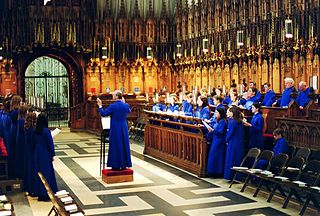
A choir is a musical ensemble of singers. Choral music, in turn, is the music written specifically for such an ensemble to perform. Choirs may perform music from the classical music repertoire, which spans from the medieval era to the present, or popular music repertoire. Most choirs are led by a conductor, who leads the performances with arm and face gestures.
The music of Iraq or Iraqi music,, also known as the Music of Mesopotamia encompasses the music of a number of ethnic groups and musical genres. Ethnically, it includes Arabic music, Assyrian, Kurdish and the music of Turkmen, among others. Apart from the traditional music of these peoples, Iraqi music includes contemporary music styles such as pop, rock, soul and urban contemporary.
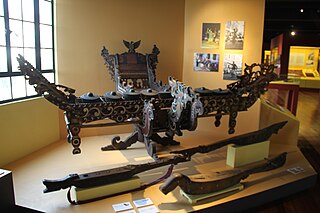
Kulintang is a modern term for an ancient instrumental form of music composed on a row of small, horizontally laid gongs that function melodically, accompanied by larger, suspended gongs and drums. As part of the larger gong-chime culture of Southeast Asia, kulintang music ensembles have been playing for many centuries in regions of the Eastern Indonesia, Southern Philippines, Eastern Malaysia, Brunei and Timor, Kulintang evolved from a simple native signaling tradition, and developed into its present form with the incorporation of knobbed gongs from Sundanese people in Java Island, Indonesia. Its importance stems from its association with the indigenous cultures that inhabited these islands prior to the influences of Hinduism, Buddhism, Islam, Christianity or the West, making Kulintang the most developed tradition of Southeast Asian archaic gong-chime ensembles.

A concert band, variously also called a wind ensemble, symphonic band, wind symphony, wind orchestra, wind band, symphonic winds, symphony band, or symphonic wind ensemble, is a performing ensemble consisting of members of the woodwind, brass, and percussion families of instruments, and occasionally including the double bass or bass guitar. On rare occasions, additional non-traditional instruments may be added to such ensembles such as piano, harp, synthesizer, or electric guitar.
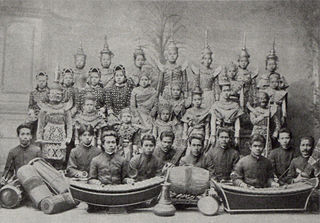
The music of Thailand reflects its geographic position at the intersection of China and India, and reflects trade routes that have historically included Africa, Greece and Rome. Traditional Thai musical instruments are varied and reflect ancient influence from far afield - including the klong thap and khim, the jakhe, the klong jin, and the klong kaek . Though Thailand was never colonized by colonial powers, pop music and other forms of modern Asian, European and American music have become extremely influential. The two most popular styles of traditional Thai music are luk thung and mor lam; the latter in particular has close affinities with the music of Laos.

A brass quintet is a five-piece musical ensemble composed of brass instruments. The instrumentation for a brass quintet typically includes two trumpets or cornets, one French horn, one trombone or euphonium/baritone horn, and one tuba or bass trombone. Musicians in a brass quintet may often play multiple instruments. Trumpet players for instance may double on piccolo trumpets and flugelhorns. There can be variation in instrumentation depending on the type of quintet. In some quintets, the horn is replaced by an additional trombone. Euphonium may also be substituted for the trombone part. While the tuba is considered a standard, the range and style of many pieces lend themselves to being played with bass trombone as the lowest-pitched instrument. Additionally, some pieces call for the use of percussion instruments, particularly the snare drum, tambourine, or timpani.
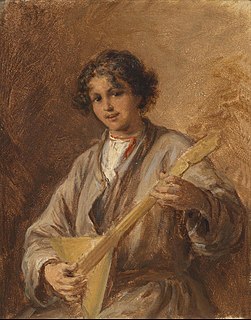
Russian traditional music specifically deals with the folk music traditions of the ethnic Russian people. It does not include the various forms of art music, which in Russia often contains folk melodies and folk elements or music of other ethnic groups living in Russia.
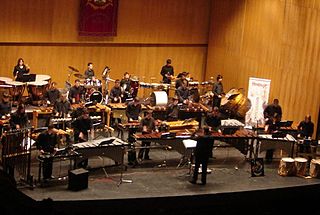
A percussion ensemble is a musical ensemble consisting of only percussion instruments. Although the term can be used to describe any such group, it commonly refers to groups of classically trained percussionists performing primarily classical music. In America, percussion ensembles are most commonly found at conservatories, though some professional groups, such as Nexus and So Percussion exist. Drumlines and groups who regularly meet for drum circles are two other forms of the percussion ensemble.

The University of Michigan School of Music, Theatre & Dance is an undergraduate and graduate institution for the performing arts in the United States. It is part of the University of Michigan at Ann Arbor. The school was founded by Calvin Brainerd Cady in 1880 as the Ann Arbor School of Music, and it was later incorporated into the University of Michigan with Cady joining the faculty.

A rehearsal is an activity in the performing arts that occurs as preparation for a performance in music, theatre, dance and related arts, such as opera, musical theatre and film production. It is undertaken as a form of practising, to ensure that all details of the subsequent performance are adequately prepared and coordinated. The term rehearsal typically refers to ensemble activities undertaken by a group of people. For example, when a musician is preparing a piano concerto in their music studio, this is called practicing, but when they practice it with an orchestra, this is called a rehearsal. The music rehearsal takes place in a music rehearsal space.

Budapest is the capital and largest city of Hungary; it has long been an important part of the music of Hungary. Budapest's music history has included the composers Franz Liszt, Ernő Dohnányi, Zoltán Kodály and Béla Bartók and the opera composer Ferenc Erkel.
A laptop orchestra or laptop ensemble (LE) is a chamber music ensemble consisting primarily of laptops. Education based laptop orchestras include BLOrk, CLOrk, CMLO, HELO, L2OrkOLO, PLOrk, SLOrk, and ELUNM (Ensamble de Laptops de la Universidad Nacional de Música in Peru. City based laptop orchestras include BiLE, and MiLO.
Collegium Musicum 90 is an English baroque orchestra playing on period instruments. It was founded by violinist Simon Standage and conductor Richard Hickox in 1990 and was jointly directed by them until the death of Hickox in November 2008.
In the years centering on 1600 in Europe, several distinct shifts emerged in ways of thinking about the purposes, writing and performance of music. Partly these changes were revolutionary, deliberately instigated by a group of intellectuals in Florence known as the Florentine Camerata, and partly they were evolutionary, in that precursors of the new Baroque style can be found far back in the Renaissance, and the changes merely built on extant forms and practices. The transitions emanated from the cultural centers of northern Italy, then spread to Rome, France, Germany, and Spain, and lastly reached England . In terms of instrumental music, shifts in four discrete areas can be observed: idiomatic writing, texture, instrument use, and orchestration.
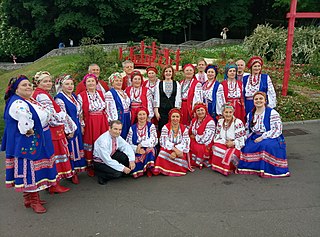
Ukrainian folk music includes a number of varieties of traditional, folkloric, folk-inspired popular and folk-inspired classical traditions.
Blue Heron, directed by Scott Metcalfe, is a professional vocal ensemble based in the Boston area. The ensemble presents an annual concert series in Cambridge, Massachusetts, and performs throughout New England as well as touring the US; it made its European debut in the United Kingdom in 2017.
Lauda Musicam of Atlanta is one of the largest musical ensembles performing early music in the United States.












